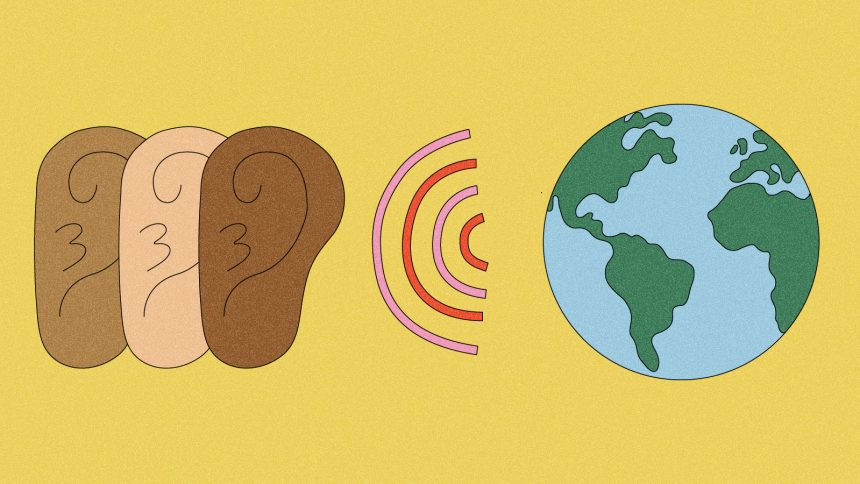The vision “I foresee a movement with a wide stance, a strong connection to ancestral wisdom, a fortified sense of self that inspires all who see and touch and join it. We spend our time transforming ourselves and our relationships to earth and each other. We show the way with our bodies and behavior, rather than shaming anyone for where they are. There is love at the center.” — Adrienne Maree Brown in Loving Corrections
The spotlight “We need each other.” Those words begin a new book by activist and scholar Adrienne Maree Brown (often styled adrienne maree brown): Loving Corrections. It’s a scientific fact that humans rely on one another; even the most introverted among us require social connection, collaboration, and community to thrive. Yet we’re living through what even the surgeon general has deemed an “epidemic of loneliness and isolation,” and our country seems to grow more divided by the day — politically, culturally, even by gender. Loving Corrections is written as a practical guide to begin to remedy some of those divisions, to reinject empathy into our interactions, and to offer an alternative to the harms of cancel culture.
“Even among those of us who long for justice and liberation, I noticed an emerging trend within our movements that looked and felt like policing each other, disposing of each other, and destroying each other,” Brown writes in the introduction. Brown (who uses both she and they pronouns) is an author, activist, and scholar, and a leading voice on the politics of activism and collective liberation, with a particular emphasis on climate and environmental justice. She has written and edited a number of books that explore themes of self-care, self-help, and best practices in movements for change — including the 2017 book Emergent Strategy, considered by many to be a movement classic. Loving Corrections is the latest in that series. The book draws on Brown’s extensive experience as a facilitator; in that role, they said, they learned how to hold a space in which people could slow down, connect as human beings, and really hear one another through sometimes difficult conversations. They thought they might be able to do the same thing as a writer. (Brown also served as a judge for Grist’s Imagine 2200 climate fiction contest in 2021, and wrote for Grist nearly two decades ago about issues of exclusion in environmentalism — a movement certainly guilty of the kind of policing Brown describes in the intro to her book.)
“I think of the work I do as growing a garden of healing ideas in public,” Brown told me. “I’m constantly trying to hone ideas that I think will be helpful to the collective, to the species, to how we relate to the Earth, how we relate to each other — and Loving Corrections emerged because I kept getting questions from people that were like, ‘OK, but how do we actually do this? How do we hold on to each other while we relinquish these systems of oppression in which we’ve been socialized, in which we’re caught up?” The book offers some specific advice, and even an example of Brown in conversation with her two sisters, showing how they’ve instituted regular check-ins with each other as a way of easing familial friction. But it’s also about more than our relationships with fellow humans. The Earth can deliver loving corrections, Brown writes, and also requires an attentive relationship. That can happen on an individual level, with the land and ecosystems around us — but for some of the systemic changes that humanity needs to make in order to heal our broken systems of extraction, pollution, and destruction, we first need to imagine better systems in their place, Brown said. That, too, can be a form of loving correction.
“We live in a world that was imagined by people who didn’t actually care about keeping our connection to the Earth intact and who didn’t really care about us being in right relationship with each other,” she said. “It matters hugely that we articulate to each other what we dream, what the world could be like — and that we don’t settle.”
Here’s a short excerpt from Brown’s book, exploring ways of thinking about our relationship to the Earth, how to listen, and how to care for this blue dot we call home. (This essay originally appeared in “Murmurations,” a column Brown started for YES! Magazine, focusing on themes of accountability.) — Claire Elise Thompson
Excerpted chapter: “Accountable to Earth,” from the book Loving Corrections by Adrienne Maree Brown
I love sitting with mothers in moments of relaxation. I was recently on vacation with some of my goddess crew, one of whom is a new mom. Her baby was sleeping in the next room, and after a bit of time and talk, we heard the sound of his voice, carried in stereo through the door and the little monitor that let us see and hear him. To be honest, anytime he wasn’t with us, we were watching the little monitor, watching him sleep, dream, move around, self-soothe. My friend sat up, alert, and held up a hand to remind herself (and us) to give him a minute to see if he needed her or was just cycling up to the surface of wakefulness before diving into the next dream. He dove, and we went back to what we were doing. An hour later, he cried out again, louder, demanding, fully awake. She moved quickly to hold him, knowing his needs with the incredible grace of a good parent. Later, I thought I heard him again, but he was awake, and it was an owl hooting deep in the Blue Ridge Mountains, the pitch of the hoot moving up, up, up the scale, and into the moonlight. Another time, it was a cat nearby, mewling for attention. I was reading a book about a talking cat, and for a moment, fiction and fantasy merged as I felt certain I knew what the cat meant: Now, now, now! The baby, the owl, the cat — they all sounded the same to me, each crying out for attention, for care, in a language that translates across species. This pattern of screaming prayer returns me to a familiar question: How do we hear beyond the human cry for help? The Earth seems to be crying. I hear the concurrent calls of one-third of Pakistan underwater in massive floods; Jackson, Mississippi, without water for drinking or toilet flushing for the foreseeable future; Puerto Rico’s power grid flooded out by Hurricane Fiona. And that suffering barely scratches the surface. There are fires that never rest into ash, there is water that doesn’t recede, waves where we need ice, islands whose highest point is now below water, heat waves that send elders into grocery store aisles while chefs cook steak on the hoods of cars. On the recent anniversary of Hurricane Katrina, I noticed how normalized these disasters have become; how comfortable we are becoming with mass displacement and death. What would it look like to answer the demanding cries of Earth, to be accountable to the needs of the planet? Given that these questions are likely already familiar to the readers of this publication, perhaps we need to ask something different: Can those of us willing to be accountable do enough to counter the choices of those bent on destruction? How? Over this past year, I have been experimenting with a climate ban on unnecessary travel. I don’t fly for work or speeches. If I am in transit, it is for love only: going to family, blood or chosen; going to home; going to health. If it’s within reach and my body is up for it, I drive my electric vehicle to get there. I’ve mostly been able to hold this practice, and it has felt like a choice that helps ease my impact on the Earth, while also easing the impact that travel and being away from the sanctuary of home has on my body. I am feeling myself more every day as an earthling, understanding how what is good for my body is good for the Earth, and vice versa. Another practice I’m interested in is folding the Earth into every other thing I do, every decision I make. When I consider any concern…






